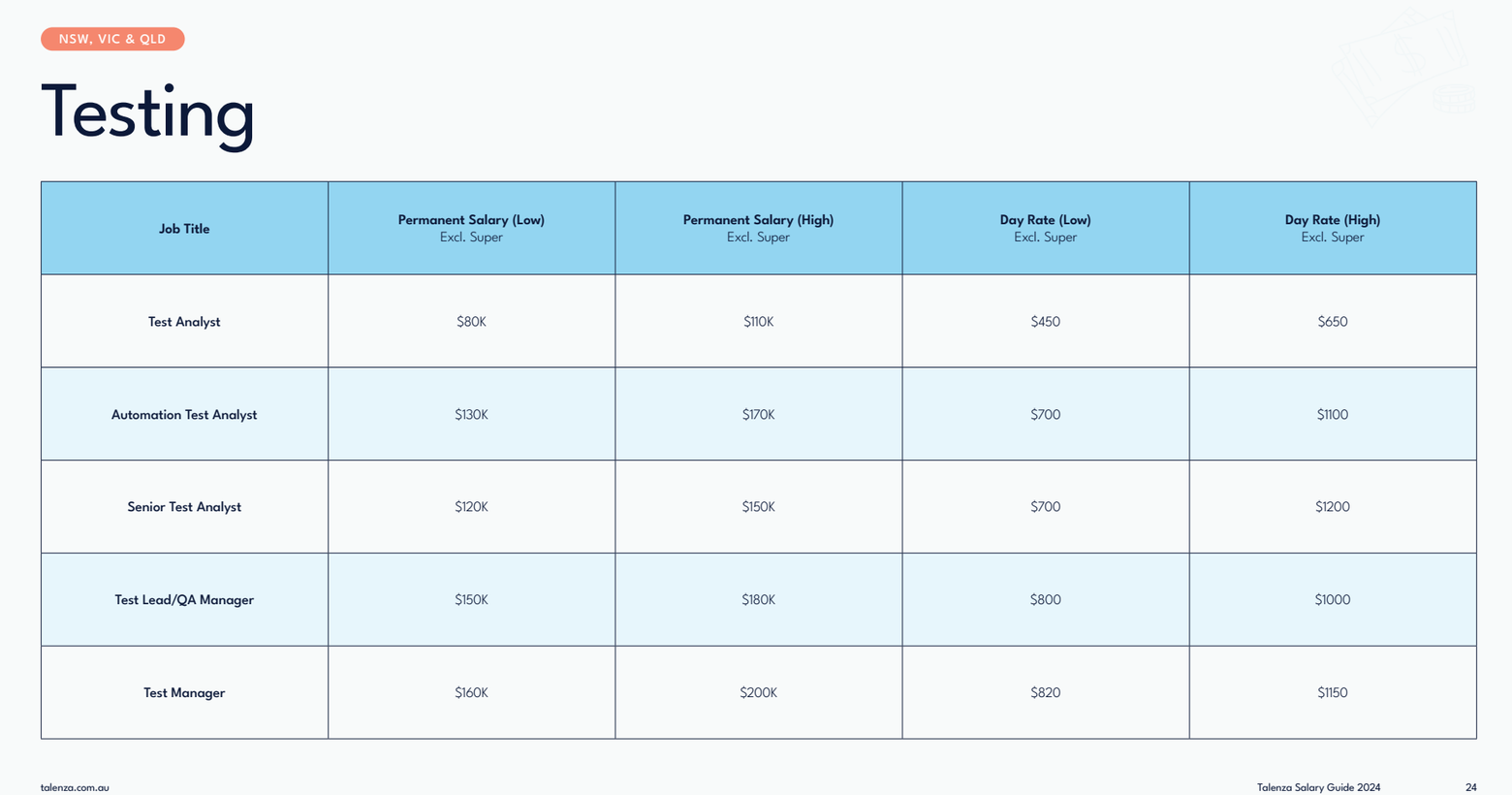Everything you need to know about Quality Engineering and Testing roles

Your guide to advancing a tech career in Quality Engineering and Testing - with salary benchmarks.
It’s no big secret that Quality Engineering &Testing has become an essential part of software development.
Quality Engineering in general plays an integral role that ensures the reliability of the products we use on the daily. And Testing ensures software meets high standards before it reaches the end user.
But being a Tester isn’t just about finding bugs. It’s about maintaining quality across the entire development lifecycle.
In short, Testing is kind of a big deal.
Here’s the 4-1-1 on:
- Career pathways in Quality Engineering & Testing roles
- The skills you need
- Market trends
- Advice for getting started
- The all important $$ question.
Market insights and trends for Quality Engineering & Testing careers
Testing is sometimes seen as a role susceptible to outsourcing. But people who specialise in Automation and Quality Engineering are finding exciting opportunities.
Companies are looking for individuals who can adapt to these evolving needs and drive innovation in Testing practices.
We asked the team about the latest trends they are seeing in Testing tech careers. Here are the major trends shaping the landscape:
1. A focus on Quality Engineering
The industry is shifting from traditional Testing to Quality Engineering. This broader approach emphasises quality at every stage of development – integrating Testing practices into the entire software lifecycle.
Companies are looking for professionals who can contribute to a culture of quality, rather than just Testing at the end of the process.
2. Automation and AI
Automation is a significant trend in tech jobs. Companies are investing in AI-driven testing tools that can predict potential issues and optimise testing processes.
This trend demands Testers who are not only skilled in traditional tools but also adaptable to new technologies.
3. Outsourcing challenges
Many large enterprises are outsourcing Testing to offshore teams to cut costs. However, this practice can dilute the quality of Testing. We find that more and more, companies are increasingly recognising the value for local expertise, which can lead to more strategic roles for Testers within organisations.
4. Industries where Testers are in demand
They key sectors actively hiring Testers include:
- Financial services
- Healthcare
- Banking
- E-commerce
- Tech startups.
These industries require robust Testing processes to ensure compliance, security, and user satisfaction.
What do Testers get paid? 💵💵💵
Ok. You can stop scrolling. You got to the good bit. We're talking dollar, dollar bills, y’all.
From entry level Tester to Test Lead, to Senior Test Analyst, here’s the lowdown on what you can expect to get paid.

Expert advice for getting into the industry
With so many opportunities – and decent pay checks – up for grabs, here’s some advice on making it as a Tester.
1. Embrace continuous learning
Testing is a rapidly changing field – so staying updated with the latest tools and practices is crucial. Commit to lifelong learning and be open to acquiring new skills.
2. Develop both Technical and Business acumen
Successful Testers have a balance of technical skills and business understanding. This dual expertise allows you to effectively communicate with both developers and business stakeholders.
3. Focus on Quality Engineering
As the industry shifts towards Quality Engineering, positioning yourself as a quality advocate can enhance your career prospects. Emphasise quality at every stage of the development process.
4. Consider career diversification
While Testing offers a rewarding career, it's also one of the most outsourced tech jobs. Consider diversifying your skills into related fields to increase your job security. Relevant related tech roles include:
- Software development
- DevOps
- Product management.
5. Network and build relationships
Networking is vital in any career. Building a strong professional network can provide support, mentorship, and job opportunities. So be sure to:
- Attend industry events
- Join online communities
- Connect with professionals in the field.
Technical skills – specialisation tools and languages
Testing is one of the most technically demanding Tech jobs due to the diverse range of skills it demands.
Here’s a run down on the key tools and languages:
6. Object-oriented programming
A solid understanding of object-oriented programming (OOP) is essential. Languages like Java, C#, and Python are frequently used in testing frameworks. For instance popular testing tools, Selenium and Rest Assured, are often utilised with Java or C#.
7. Automation tools
Automation Testing is on the rise – and proficiency in tools like Selenium, JUnit, and Appium is highly valued. These tools enable Testers to automate repetitive tasks and focus on more complex scenarios.
8. Manual Testing
While automation is crucial, manual testing skills remain relevant, especially for exploratory testing and user acceptance testing (UAT). Testers should have a keen eye for detail and strong analytical skills.
9. Mobile and API Testing
With the proliferation of mobile apps, skills in mobile testing using tools like Appium, Mocha, and PyTest are in demand. API testing knowledge is also essential, as many applications rely on APIs for functionality.
10. CI/CD Integration
Familiarity with Continuous Integration/ Continuous Deployment (CI/CD) pipelines is beneficial. Testers often collaborate with DevOps teams to ensure smooth software releases.
In summary, Testers should have a well-rounded understanding of both programming and business requirements. This dual focus allows Testers to bridge the gap between development and business teams – ensuring that products meet customer expectations.
Bringing it all together
A career in testing offers the opportunity to:
- Work on diverse projects
- Solve complex problem
- Contribute to delivering high-quality software.
By following these guidelines and staying adaptable, you could carve out a successful and fulfilling career in Testing.
Keen to know more about advancing your career in Testing?
Download a copy of your 2024 Salary Guide here.
Or contact our team to chat about your next steps:
Conor from the Melbourne team
Michael from Sydney
Alex from Brisbane.